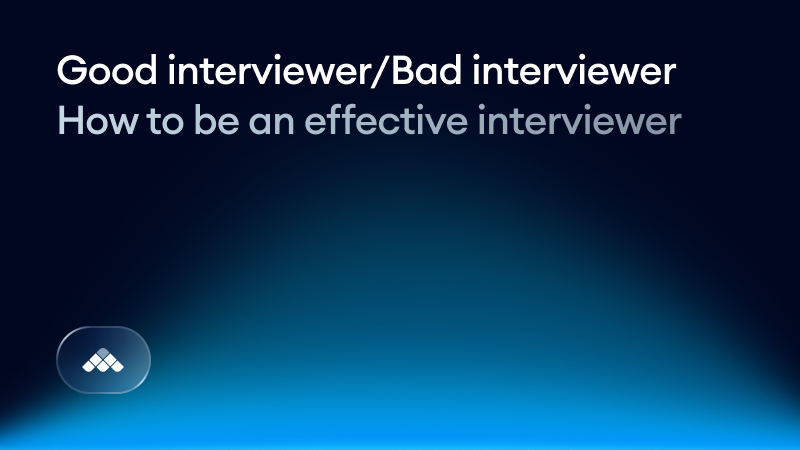Over the past five years, I’ve conducted over a thousand interviews. Most of these interviews had a behavioral component and tested engineering, product, or design competencies.
To master this craft, I’ve been painstakingly reflective and systematic because interviews are the highest leverage activity any operator can undertake.
Inspired by Ben Horowitz’s timeless post about what distinguishes good product managers from those that are bad, here’s what I believe separates good and bad interviewers.
Good vs bad interviewers
You’ll find plenty more discussion, examples, and detail below. But for the skim readers, here are the main points:
How to be a good interviewer
You’re probably a good interview if you:
- Care. You should want to learn more about the candidate, their motivations, and how they can help your team. And more broadly, you should want to help build a stronger organization, and believe that interviewing is a key part of that.
- Seek depth. Both in understanding the role you’re hiring for, and by asking probing questions and follow-ups of candidates.
- Work to improve. Interviewing is a skill, and you should want to get better with practice. Ask for feedback, coaching, and more opportunities to test your abilities.
- Write carefully notes and thoughtful feedback. Others will rely on your advice for future rounds, so the more complete and well organized, the better. (A good AI notetaker makes this a breeze.)
- Acknowledge your own opinions and uncertainties. We all bring our own perspectives and flaws to the hiring process. A good interviewer acknowledges these so others in the hiring committee can adjust if necessary. But a strong opinion is always better than a neutral, bland summary.
- Contribute without dominating. You’re part of a hiring committee, but the final decision isn’t yours to make alone. You should help uncover evidence and form your own views, but then compromise and collaborate to reach the best decision for the organization.
Signs of a bad interviewer
You’re likely a bad interviewer if you:
- Think interviews are a waste of time, or not part of your “real” job. You’re helping build your team, not doing others a favor.
- Aren’t inquisitive, and don’t want to get to know the candidate deeply. You should always have follow-up questions and be genuinely interested in responses.
- Never prepare. Even after a dozen interviews for a given role or team, you should go into each call knowing who you’re talking to, and what you hope to learn from them.
- Present your opinions as facts. Opinions are valid and can be helpful, but you also need hard evidence and quotes to support assertions.
- Rely only on word-for-word quotes. While you will need interview quotes to support your position, it’s the meaning behind what was said that actually matters, more than how they said it.
There’s plenty of nuance, and it can really help to see these examples side by side. So again, with a nod to Horowitz’s good versus bad product managers, here’s what separates strong interviewers from poor ones in detail.
Telltale signs of good vs bad interviewers
Good interviewers understand that interviewing is as much about identifying talent as it is about attracting talent — they’re talent scouts and talent magnets. On the one hand, they accurately assess whether they want to work with the candidate. On the other hand, they make the candidate want to work with them. Good interviewers know that failing to close an excellent candidate is a silent company killer.
Bad interviewers think interviewing is a waste of time. A bad interviewer asks for additional compensation for the time they spend interviewing. Bad interviewers consider the task a favor.
“I could be coding.”
“I’d rather think about our design system.”
“Why can’t someone else do this interview?”
Bad interviewers don’t understand that interviewing is the mother of all second-derivative activities.
Bad interviewers aren’t inquisitive. A bad interviewer doesn’t know when to ask a follow-up question because they’re not genuinely interested in learning. Bad interviewers ask questions verbatim off a script so that they can tick them off.
A bad interviewer transacts. A good interviewer interacts. Bad interviewers don’t recognize the value of depth. Good interviewers are constantly looking for opportunities to go deep.
A good interviewer drives the interview intentionally, pivoting along the way and updating their working hypothesis about the candidate as the interview goes on.
Bad interviewers over-index on the literal statements the candidate makes. Good interviewers look for the truth behind the statements.
Good interviewers empathise with the candidate’s future teammates. Bad interviewers empathise with the candidate.
Good interviewers are consistent. They evolve their methods intentionally and carefully. Good interviewers periodically insist on being shadowed because they’re paranoid about becoming inconsistent or slipping into destructive habits.
A good interviewer appreciates that interviewing is a human interaction resulting in human judgment. Bad interviewers think interviewing is math.
Good interviewers give a shit. They help other interviewers. A good interviewer regularly offers to reverse-shadow their peers. When a good interviewer senses the quality of the interviewing machine degrading, they pull the Andon Cord — they consider themselves responsible for fixing it. Good interviewers understand the importance of interviewer training.
Bad interviewers go into an interview not knowing who they’re interviewing. A bad interviewer hasn’t tried to figure out the candidate’s name, they’re not sure what role they’re interviewing for, and they don’t know the candidate’s interviewing schedule for the day with their company. A bad interviewer asks, “do you have a hard stop after this?” even though the candidate has an interview with one of their colleagues after. Bad interviewers don’t prepare.
Good interviewers wish they could run an interview again because they could do better. When an interview doesn’t go smoothly or feels awkward, bad interviewers blame the candidate and are glad the interview is over. Good interviewers know it’s their fault and are annoyed that they don’t have the chance to go back in time and try harder.
Good interviewers write thorough feedback about candidates. Bad interviewers never have time for that.
A good interviewer offers an opinion instead of just a neutral summary. They support their judgment with concrete examples. A bad interviewer supports their judgment with hubris. Good interviewers indicate which of their opinions might be impacted by bias. Bad interviewers think they have no bias.
Good interviewers know they are contributing to a hiring decision. Bad interviewers believe they are making a hiring decision.
A good interviewer is mentally fatigued by the end of an interview.
How to improve interviewing skills with AI
Whether you find yourself (or your team) at the good or bad end of the scale (or somewhere in between), you can always improve. And thankfully, modern tools actively help bring the best out of interviewers.
By removing the distractions and inconsistencies that often get in the way, interviewers can focus on running higher-quality conversations with candidates. Whether you’re trying to improve your own performance or upgrade a below-par hiring committee, here’s how modern AI hiring tools can help.
- Capture notes automatically: Instead of splitting their attention between listening and typing, interviewers can focus fully on the candidate in front of them. AI-generated notes ensure nothing is missed, capturing the conversation with far more consistency and detail than memory or busy scribbling ever could.
- Generate instant feedback: As soon as the interview wraps up, AI provides a clear write-up of key takeaways, aligned to your hiring rubric. This makes it simple for interviewers to share their perspective quickly, while giving the hiring committee timely, structured insights to compare across candidates.
- Highlight the essentials: Interviews often contain valuable quotes or moments that reveal a candidate’s skills, motivations, or red flags. AI pinpoints those highlights automatically, so interviewers and hiring managers can reference them easily in discussions and decision-making.
- Cut down on admin: Preparing, documenting, and writing feedback can turn interviews into a time-consuming chore. By automating much of this work, AI lets managers approach interviews with energy and enthusiasm, making the process smoother for both interviewer and candidate.
- Spot coaching opportunities: Not all interviewers are equally skilled, and biases or inconsistent practices can creep in. AI helps talent leaders identify patterns—such as interviewers who talk too much, ask inconsistent questions, or fail to tie feedback to competencies—so they can provide targeted coaching.
- Reveal process-wide trends: AI both improves individual interviews, and connects the dots across many. It surfaces recurring themes, such as compensation concerns or reasons candidates decline offers, giving leaders the insights they need to refine hiring strategies and candidate experience at scale.
By handling the heavy lifting, AI tools let interviewers, and the leaders guiding them, prioritize fairness, depth, and consistency in every hiring conversation.
Bad interviewers are unprepared. Good ones have great tools.
Smart hiring decisions come from great interviews, and the companies that win top talent run interviews with clarity, consistency, and care. Today, AI recruiting tools make that a reality for every organization.
With AI tools like Metaview, talent leaders can ensure interviews are consistent, objective, and genuinely reflective of candidates’ skills. For individual interviewers, it means less admin and more focus on meaningful conversations. For companies, it means a stronger, more scalable hiring process.
Equip your team with AI-powered interviewing superpowers. Start your free trial of Metaview today.


